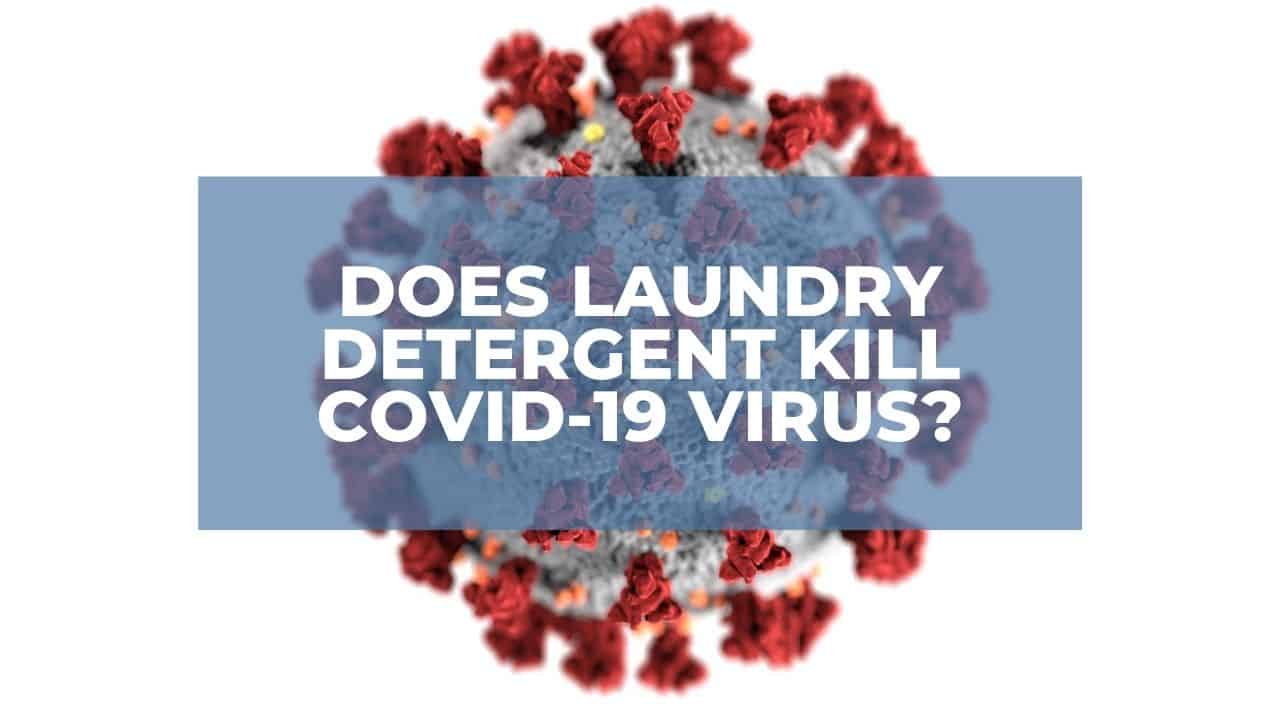As people are striving to comply with the health department’s safety guidelines against the novel Covid-19, myriads of questions remain unanswered. One of the questions that we’ve frequently bumped into is; does laundry detergent kill Covid-19 virus?

We researched and came up with a comprehensive answer — plus a few guidelines — to further help our readers keep safe from the virus.
Quick Navigation
How The Laundry Detergent Works
Detergent is made of many components, but we’ll only wrap our heads around how it primarily works to get rid of fat/grease/dirt.
A detergent molecule has a pin shape with two parts; a head and a tail. Each part has a different characteristic, with the head being “friendly” to water (hydrophilic) and the tail being an “enemy” of water (hydrophobic). These characteristics are basic to how a detergent often works to destroy viruses and bacteria.
When the detergent molecules are suspended in water, their tails will combine with fats and oils while the heads will be more attracted to water. Consequently, the tails will come together, resulting in a bubble shape with the molecules’ heads pointing outwards. This is called a micelle.
How A Detergent Kills The Covid-19 Virus
Coronaviruses, bacteria, and other infectious microorganisms often feature protein membranes. Like breath is to life, these proteins perform quite a few vital roles for the bacteria and viruses’ day-to-day survival. Without them, the microorganisms can’t live a minute! What’s more, the lipid membranes are what makes it possible for these microorganisms to attack the human body cells.
When the microorganisms meet the laundry detergent, their membranes combine with the detergent’s hydrophobic tails, which come together to form micelles (as demystified above). This means that the protein membranes are destroyed, and the microorganisms’ cells remain without essential parts that help them survive and or attack the human body. The viruses/bacteria then gets annihilated and washed away by water.
So, yes, the laundry detergent kills the Covid-19.
How Many Times Should You Wash Clothes?
Well, that depends on whether the clothes are contaminated, exposed to contamination, or safe. If you haven’t been to a crowded place and have been keeping up with the recommended healthy guidelines, your clothes are likely virus-free. Washing them should be as regular as you often do.
However, contaminated and exposed clothes should be treated more carefully. For example, you shouldn’t shake such clothes to avoid dispersing viruses into the air. You should also ensure that your hands are protected by disposable gloves while washing the clothes.
Always use warm water at around 70-80 degrees Celsius if you’re using the washing machine to clean the clothes. Moreover, you must ensure that you keep with other safety guidelines.
Is It Safe To Go To The Laundromat?
The brief answer is yes, and you’ll get the explanation as you continue perusing.
Keeping safe from the Covid-19 virus is all about complying with the laid-down safety measures. The laundromat is an example of crowded places, and being there increases your exposure to the virus. However, you can keep safe and still get your clothes clean and the virus killed.
At the laundromat, you have to be careful about everything you do. You simply need to comply with all the rules by the health department that you know. For example, don’t touch any unsafe surface (one that’s not disinfected).
Avoid touching your face before washing your hands using a piece of soap or detergent. Also, keep social distance with others in the laundromat.
After washing your clothes, wash your hands before you leave for home, and wash them again upon getting home to avoid any chances of exposing others to the virus.
How Long Does The Virus Stay On Clothes?
Studies around how long the Covid-19 can stay on the surfaces of various materials have yielded results. The virus seems to stay longer on wood and metal than other materials.
For example, it can stay on cardboard for a maximum of 24 hours and on stainless steel for three days at most. Most studies conclude that the virus will stay for a whole two days on your clothes made fabric. There are conditions for the duration that the virus can take on your clothes.
As different clothes are made of various materials, not all clothes will harbour the virus for two hours. Parts of the clothes made of copper will enable the virus to stay longer, and so on. That’s why there’s no conventional number of days that the virus stays on clothes.
How To Wash Contaminated Clothes Properly
You need a few guidelines and precautions to successfully wash coronavirus-loaded clothes without contracting the virus.
Firstly, you’ll need to ensure that you have enough detergent. You should know how to use the detergent properly. The label of the detergent has guidelines on how to use it without a hitch. You also need to have enough water. When germs have been killed, there needs to be water that washes them off.
Use a pair of disposable gloves. Not having one doesn’t harm, but it’s safer to use one. If you’re using a washing machine, be sure that you set the washing temperature high enough to kill the coronavirus. The COVID-19 often does at 70°C.
Do Clothes Spread The Virus?
That goes without saying, but the chances are quite low, says the CDC. Nevertheless, you’re better safe than sorry. There are several ways by which the virus can reach your body from contaminated clothes, but the chances are little that it stays on your clothes.
Some of the ways by which the virus can spread from clothes into your body include when you breathe in the fabric from contaminated clothes that have been shaken — or when you touch the contaminated area using your hands.
Likewise, the virus can get into your body when you put on contaminated clothes. Failure to wash your hands after handling contaminated clothes is also dangerous.
The Bottom Line
Laundry detergent kills the Covid-19 the same way that soap does it. While washing contaminated clothes, however, you need to take more measures to prevent the virus from reaching your internal organs, leave alone killing it.
Using warm water, wearing gloves, disinfecting the clothes after washing, washing your hands regularly, avoiding shaking contaminated clothes, and disinfecting the surfaces you touch on the washing machine are just a few ways to take more care.


